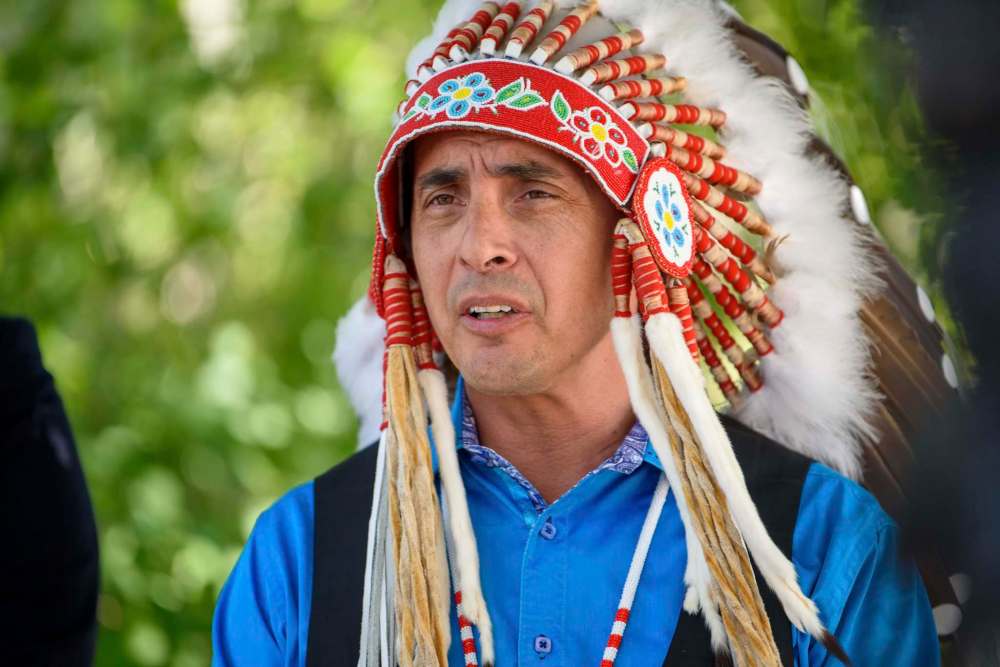Grand chief became vaccination advocate as son’s health deteriorated
Advertisement
Read this article for free:
or
Already have an account? Log in here »
To continue reading, please subscribe:
Monthly Digital Subscription
$1 per week for 24 weeks*
- Enjoy unlimited reading on winnipegfreepress.com
- Read the E-Edition, our digital replica newspaper
- Access News Break, our award-winning app
- Play interactive puzzles
*Billed as $4.00 plus GST every four weeks. After 24 weeks, price increases to the regular rate of $19.00 plus GST every four weeks. Offer available to new and qualified returning subscribers only. Cancel any time.
Monthly Digital Subscription
$4.75/week*
- Enjoy unlimited reading on winnipegfreepress.com
- Read the E-Edition, our digital replica newspaper
- Access News Break, our award-winning app
- Play interactive puzzles
*Billed as $19 plus GST every four weeks. Cancel any time.
To continue reading, please subscribe:
Add Free Press access to your Brandon Sun subscription for only an additional
$1 for the first 4 weeks*
*Your next subscription payment will increase by $1.00 and you will be charged $16.99 plus GST for four weeks. After four weeks, your payment will increase to $23.99 plus GST every four weeks.
Read unlimited articles for free today:
or
Already have an account? Log in here »
Hey there, time traveller!
This article was published 10/07/2020 (1936 days ago), so information in it may no longer be current.
OTTAWA — Manitoba’s grand chief says he was a vaccine skeptic until his ailing son needed a major medical procedure.
“You vaccinate animals; I wouldn’t immunize my kids,” is how Grand Chief Arlen Dumas characterized his past thinking about immunizations, urging families to get the flu shot in the fall.
“I used to have sort of principled positions on how I felt about immunizations,” he said Friday during an Assembly of Manitoba Chiefs COVID-19 webcast.

“Unfortunately, you have to go learn and educate yourself and find out this stuff.”
Dumas’s eldest son, Achahk, died in March 2019 at age 18 from complications related to cystic fibrosis.
Before that, he required a lung transplant, changing his father’s world view.
“Because it was so important for him to receive (the transplant), I really had to do a lot of research, and I had to do a lot of thinking on that whole idea of immunizations,” he said.
“I, too, would encourage anyone: if you can, please immunize your babies. Let’s keep everyone as healthy as possible,” Dumas said.
CF is a genetic disease that can’t be prevented, though medical experts recommend vaccines including annual flu shots to keep up general lung health.
The Manitoba government offers the chickenpox vaccine to anyone with high-risk medical conditions including CF, and strongly recommends people living with CF get the annual flu shot, as well.
Vaccines came up during the livestream in the context of an anticipated second wave of the coronavirus in the fall.
Dr. Marcia Anderson, a medical officer of health, said she was concerned about Indigenous people not getting the flu shot when it becomes available, leading to worsening outcomes and the health-care system grappling with both COVID-19 and the flu at the same time.
“Vaccines are not perfect… but there is a ton of evidence about their effectiveness,” Anderson said, noting that measles is resurgent in parts of North America where immunization rates have dropped.
Studies show 20 to 30 per cent of Canadians are “vaccine hesitant,” meaning they tend to delay or outright refuse to have their children immunized.
It’s less common for parents to forgo any vaccines, though refusal rates have been rising, which experts have linked to anti-vaxxer websites and conspiracies on social media.
Anderson said the focus on COVID-19 has added to the difficulty in making sure children get their shots.
“There are a lot of kids who got behind on their vaccines in that time where we were really shifting to virtual care for only really necessary things, because of the risks of being in the health-care setting,” she said.
“Now’s a great time as well to get caught up on those vaccines.”
In 2009, the H1N1 swine flu impacted First Nations people to a greater extent than any other group in Manitoba.
However, University of Manitoba health professor Michelle Driedger has documented how the rollout of the H1N1 vaccine in Winnipeg was hampered by communications challenges.
Officials had expedited safety tests and selected Indigenous people as a target population, likely because they have a higher rate of other health conditions.
But the term “adjuvanted vaccine” — referring to one with added substances to boost immune response — confused some people, and the sped-up testing stoked conspiracy-style fears that Indigenous people were being used as guinea pigs.
Researchers are already preparing for how to publicize a COVID-19 vaccine if it comes along without isolating the most vulnerable people.
dylan.robertson@freepress.mb.ca


